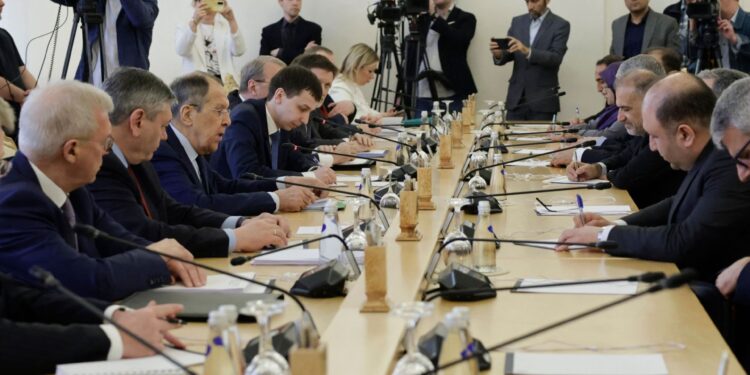Both Russia and Iran are moving towards an unprecedented deepening in their strategic partnership. This relationship – which was strengthened after the outbreak of the war in Ukraine – is no longer limited to political understandings, but rather extended to major agreements in the areas of trade, energy and nuclear.
It seems that Tehran and Moscow seek to form an alternative economic axis capable of steadfastness in Western sanctions, and are prepared to reshape the balance of power in the region.
Free trade
The French Press Agency stated that Moscow and Tehran are expecting a significant increase in trade exchanges between them, with a free trade agreement into implementation on May 15.
“The free trade agreement opens many prospects for cooperation … and provides great opportunities for trade exchanges between our two countries,” Russian Energy Minister Sergey Tsifilioff said during a meeting of the Russian -Iranian government committee in Moscow.
The agency indicated that this agreement comes within a broader strategic partnership treaty signed last January, and Russia ratified it in early April.
For his part, Iranian Oil Minister Mohsen Bak Ahmadine stated, during the meeting, that trade exchanges “will increase several times” thanks to this agreement, stressing that there are great capabilities that have not been exploited yet. Tsifiliof added that the volume of exchanges between the two countries amounted to $ 4.8 billion in 2024, but he pointed out that “commercial capabilities are much greater.”
Gas without pricing
Reuters reported that Russia and Iran have reached an initial agreement to supply 55 billion cubic meters of Russian gas annually to Iran, but without agreeing to the price so far.
The agency quoted Tsifiliof as saying that Russia may provide Iran during 2025 with up to 1.8 billion cubic meters of gas, as a start to implement the agreement.
According to Pak Ahmadinejad, to the Iranian Oil Ministry website, “Shanna”, Russia will provide funding for the construction of a new nuclear power plant in Iran, through Russian credit facilities.
Oil and gas projects
According to the Iranian minister in an interview with official television, Tehran is about to sign an agreement worth 4 billion dollars with Russian companies to develop 7 oil fields inside the country, a step that strengthens the Russian presence in energy infrastructure in Iran, as reported by Reuters.
Reuters said that the agreements between the Russian “Gazprom” company and the Iranian National Gas Company include the implementation of a regional gas distribution center project in Iran, with possible participation from countries such as Qatar and Turkmenistan. Planning is also taking place to create tubes to transport Russian gas to Iran, although the potential tracks are not announced yet.
Civil nuclear in Russian coordination
The French Press Agency indicated that cooperation in the field of “civilian nuclear energy” was presented within the agenda of the Russian -Iranian meeting, and included proposals for the construction of new groups of nuclear stations. The Iranian Oil Minister did not reveal additional details about these projects.
Russia has played a fundamental role in building the first Iranian nuclear reactor in Bushehr, which reflects the depth of technical cooperation between the two countries in this field.
The West is suspected and Tehran denies
Western powers, led by the United States, are suspected that Iran is seeking to own a nuclear weapon, but Tehran denies these accusations and confirms that its nuclear program is dedicated to peaceful purposes.
The French press said that the Kremlin had repeated his willingness to make “what he can” to support efforts to reach a diplomatic solution, in light of negotiations taking place between Tehran and Washington by Omani.
Growing relationships
The French press said that the Russian -Iranian relations have witnessed an accelerated development in recent years, especially after the Russian attack on Ukraine, and Moscow seeks to overcome Western isolation. She added that Russia and Iran, along with China and North Korea, are weaving close ties in several fields, including the military field, in the context of what looks like an anti -West front.
Reuters quoted Iranian minister Buck Nojad, after his meeting with Russian Deputy Prime Minister Alexander Novak, that the “OPEC Plus” alliance will continue to make decisions that guarantee the stability of the oil market, despite the state of ambiguity in the market as a result of international economic changes.
The agency reported that a number of coalition members are studying accelerating the pace of production in a scheduled meeting next May, amid fears of the effects of international customs duties and low demand.



